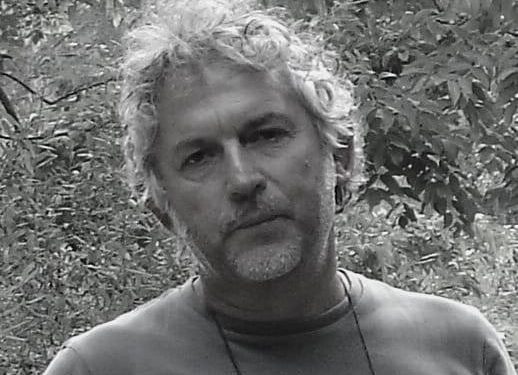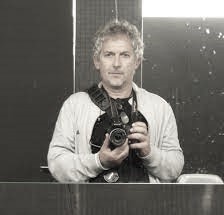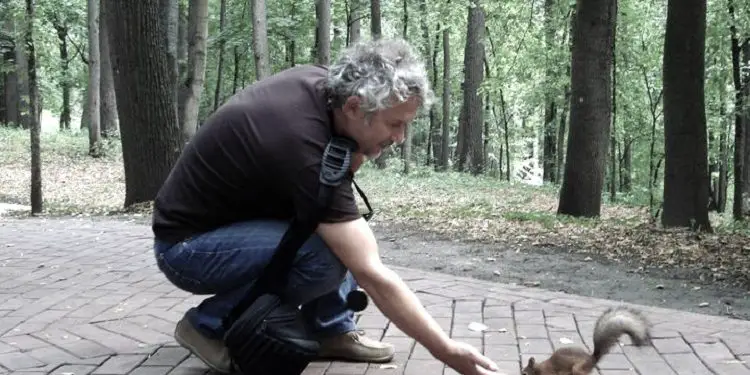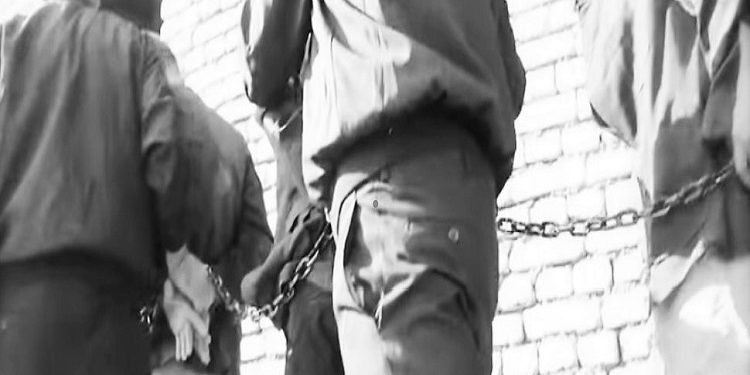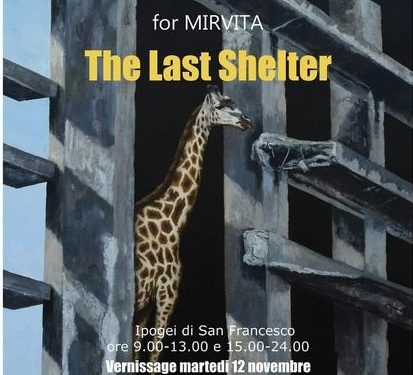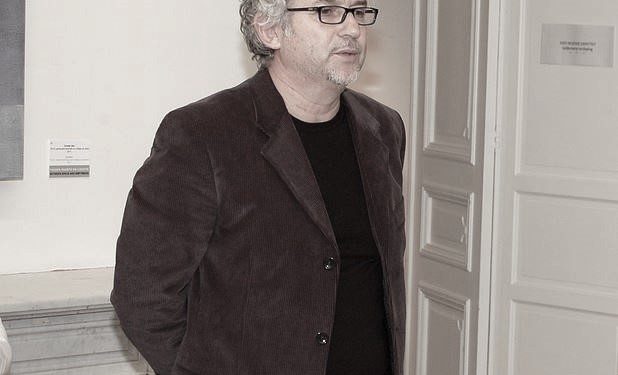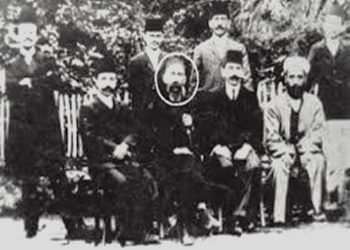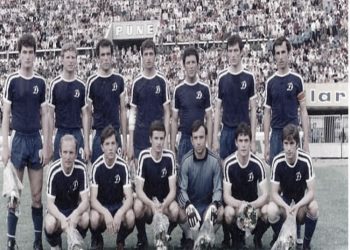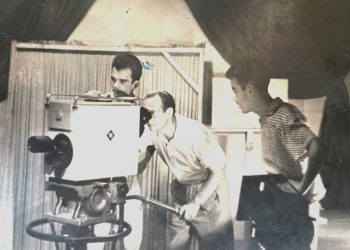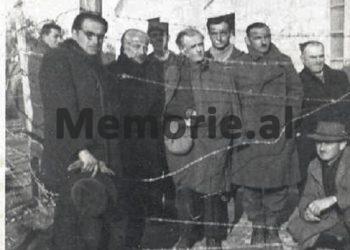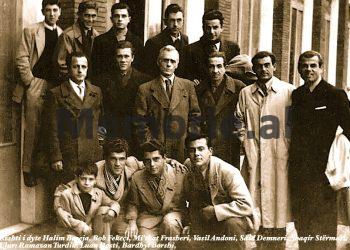From Alma Mile
Memorie.al / “At night I am in prison, during the day I am in Italy, in my ordinary life”. This is what Valer Tarasov Dyrzi says, after 30 years of escaping the ordeal of imprisonment. Although he has tried to move forward and build his own life, the shadow of those years continues to follow him even today, when he still continues to sleep in the same position, as in the narrow beds of Ballshi prison. Valer Dyrzi, today is a well-known painter in Italy, but 45 years ago, he was just a young man, who was sentenced to 13 years of imprisonment, for “agitation and propaganda and attempted escape”. He was the son of a beautiful Russian woman and a well-known engineer. She was sentenced to 8 years in prison, while her father was transferred to a mountainous country.
Valeri was arrested in 1978, together with Sokol Ngjela (Spartak Ngjela’s brother), for some “compromising” materials against the leadership, but also for “decadent” behavior, which were nothing more than some concerts organized in youth camps . He was sentenced because his dreams crossed the borders of Albania. After he got out of prison, he left for Italy, with the “escape” of the embassies, where he started a new life, without looking back.
After 19 years, he returns to Tirana for the first time, where, pushed by his former classmate, Loreta Mokini, who was working together with Ismail Kadare, for a film about Russian women, he tells about his life, since the arrest, the years in the cell, the departure to Italy and the life beyond the sea. This, according to him, is the first time he opens “Pandora’s box” to return to the past.
Mr. Dyrzi, you served 10 years in prison, you were very young then, why were you targeted by the regime?
The persecution had already started in 1974, when I was 18 years old. At that time in Lure, in the youth camps, we were looking for our ’68, with our simple initiatives. Singing, giving concerts, painting, reciting, declaiming what we had written. And these things were not imagined then. The famous plenum had taken place, by which many people were condemned, and after that, everything was closed for us.
While in the world in the 70s, culture had taken another leap, new groups, singer-songwriters had emerged, we continued to have connections with Rai radio, BBC and Luxembourg. There were very few tape recorders and we tried to survive, only with music and art, and the reading we did secretly. Think, if someone found a banned book, you would be punished. All this was agreed upon. The activities we had done in Lure were not liked and I had the file open since I was 18 years old. I realized that they were following me, where one day, when I go to buy bread, I meet some men with 26-inch bicycles and “Gub” coats.
When did these pursuits become threatening to your family?
In 1974, the political blows become strong. They removed him from the university, while he (Seit Dyrzi), who was a chief engineer, geodesist, laureate of the “Republic Award”, builder of several hydropower plants, was removed from the ministry and moved to a mountainous area.
Within the walls of the house, we spoke and read only Russian, we did not buy any newspapers, we listened to foreign radios, and when we left the gate, for us it was like going abroad. The little world we had created inside the house had to face the big world. And many others knew this. Tirana was small at that time.
The first to be arrested was your mother…?
With my mother’s arrest in 1976, another chapter began for us. They accused him of espionage. She held on very tightly and did not accept anything. They pressured her and told her that if she didn’t agree, they would put me in jail, and she said: “Okay, arrest him.” They sentenced him to 8 years. I was not given the opportunity to continue school. I worked as a porter at the train station. My friends didn’t believe it, it seemed like the next snobbery, but for me to work there, people must vouch for me.
When it was your turn, do you remember the day of your arrest?
Not long after my mother was arrested, I was also arrested. I was 22 years old and at that time, when a perspective should be opened before young people, everything was closed to me. I remember when I was arrested in Vlora, where I was a soldier, they brought me to the military police, in the garrison, which was located on “Elbasan Street” and while I was in the “Gaz” vehicle, under the bars, I saw my classmates leaving the faculty .
Then he passed by the “Sami Frashëri” gymnasium, where I had the girl I loved, I see her leaning against one of the trees in front of the school…! They took me to Tirana prison and as soon as I smelled the military warehouse, I said: “It’s over”! But at the same time I was released. “It finally came, there is no more anxiety, and there is no more tension.” The arrest was expected. We could hear the sound of every car passing in front of the house. If it was late at night, there would definitely be an arrest.
Why were you accused?
For “propaganda agitation and escape attempts”. Until then I had not attempted to escape, but I would have done so if I had not had mine in prison any longer and had to take care of him. They invented undead hostile groups. I found out that we had been spied on by many boys, whom we had considered our friends.
But I can’t help but say that none of the school friends refused to talk or tell anything. It was not difficult to find a reason to be arrested at that time. We talked about topics that others didn’t dare to, like human rights, Solzhenitsyn, Bob Dylan, ’68, Bukowski. At home they found a photograph of Joe Cocker, which they also used as evidence during court hearings. They didn’t even know how to read his name…!
Where did you serve your sentence and what were the conditions like there?
In the Ballsh prison where I first went, the conditions were terrible. We lived in large silos, with 200-300 people, covered with ethernet, with narrow wooden beds, one meter each. Even when the prison became more populated, they narrowed us down even more. Believe me, even today I only sleep on my ribs.
People died there every day. When the flu hit, everyone got sick…! The seriously ill or the elderly were taken to a separate silo, which we called the “death silo”. If you went in there, you would say you would die. We had clothes like those of Hitler’s concentration camps, meringue with gray stripes.
The entire sentence was carried out in Ballsh?
No, not only in Ballsh. I have visited all the prisons, where we were punished and tortured. After Ballshit, I went to Zejmen, Gërmenj, then to Qafë-Bari, Spaç, and again to Qafë-Bari, from where I was released. I haven’t been to Burrel alone.
How was “life” inside the cell?
When I was sentenced to 13 years, I made a plan of what I was going to do. Indeed, I have never been a prisoner in my mind. I would get up at night and draw. Drawing was forbidden and every two weeks we were checked. To break the monotony, I expressed my art with embroidery. I used to take cloth and draw and embroider, and men from 50-60 years old, ordered their families for moline and embroider. At that time, the mother was in Kosovo, Elbasan, and we had a wonderful relationship. Once I make him a card, for his birthday. We had the right to take three postcards and 2 pages, in 15 days and all were controlled by the camp operator.
You hadn’t studied painting before, had you?
In prison I had a lecturer with Parkinson’s, his name was Vangjel Tushi, who was convicted for distributing tracts. Absurd to think, with his illness…! A wonderful man. I would get up at night, open the “Nëntori” magazine, which was the only one that was not checked, and draw with a fountain pen, people sleeping, portraits, and in the morning I would go to the professor, who would comment on the work I had done. He gave me lectures on the history of art and the same thing happened on literature, philosophy…!
The prisoners also did heavy work, when did you find the time to study and paint?
It is true, the prisoners worked hard. I remember Visar Zhiti, filling and pushing wagons that were extremely heavy…! I haven’t worked a day there. I told them: “Kill me, because I don’t work”! So I had time to take care of myself. With a chisel that I had made myself, I made small sculptures out of bones and took them out of the cell. This is how I lived, with dreams, disconnecting from reality, writing…! Since I was a child, I had a dream, to create a world that is not.
What happened after leaving prison?
The day I came out, they told me that I was going to open a channel. I was left without a job. At that time we entered the embassy, organized ourselves and upon arrival in Italy I began to actively expose the power of that time. A famous show “TG2 dossier”, opened with my face, slightly masked, (but Tirana recognized me), with the expression: “Freedom is not a free space, freedom is participation”.
How did you fit in Italy, was it really the “Promised Land”?
Even in Italy it was not easy. At first, the roads were opened for us, but they also had their own interests. I had big problems, but I managed to start my life. I started with foreign languages, but I also washed dishes and did other menial jobs. At night I painted and with the money I collected, I visited museums, so that I could grow and not copy, make my own way. As soon as I came to Italy, I took part in an international competition in the 1990s and won the second prize.
Gëzim Sinemati, publishes the first article with a copy of the award in the “Bashkimi” newspaper. Newspapers such as “Independent”, “Corriere della sera”, “La Reppublica”, “El pais” write about the Albanian of the embassies, who won an award. Meanwhile, in Tirana, they pressured my mother and sister, they told me to return, because otherwise, they would not let them go to Moscow, since they had requested to go to Russia. My mother, father and sister remained here and with difficulty went to Russia.
In ’96 I won an Italian competition for public works and that was very important for me, then another in ’98. I continued to work intensively. I had a personal disaster and I had to get back on my feet, restart my life. Even painting is a blank page, to be filled and if the mind is not able to create, then you can die as a person. Yet life goes on, I stand up again.
Since the time of your departure, you never came to Albania, why?
Here I have people I love very much, I have relatives, friends, who sat by me. When I was here, I was always the son of Russia; I was never Albanian-Albanian, even though I was very integrated. In Italy, when Albanians gave “their best”, very soon, a kind of racism against Albanians started and I had to suffer the other half. So I had to shut myself down, put up an iron curtain, isolate myself, and create my own life with my new friends, who are everywhere, always respecting this country for what it deserves and criticizing it for what it should.
The noblewoman who left Russia, for love
She came from a noble family. Her ancestors were founders of universities. In the city of Yekaterinburg, all those who have the surname Tarasov, are honorable people, generation after generation. The great-grandfathers had been Knights of St. George 3 times. And he left everything, for the love of an Albanian. Inga Tarasova is one of the many Russian women who left their country to follow Albanian lovers. But she also suffered a full 6 years in prison, for “espionage”. She was beautiful, with red hair and sky-blue eyes, and in the small Tirana of the 70s, there was no way not to catch the eye…! “They met in Moscow. Mine followed me, as my father had come here. He took the ferry and came to a simple family from Tirana, honest, with a hip, grandfather, who had a company of friends, who rented it to him. There were two worlds full of contrasts and she adapted with great humility, she adapted to these conditions. Of course, we lived in the center of Tirana and were a respected family. The mother has two degrees, one in economics and the other in philology”, says her son, Valeri. In Tirana she gave lessons in the Russian language and many generations passed through her hands, including many artists and they remember her constantly, not because she taught them Russian, but also to have self-respect.
Father Zef Plum’s carnations
In the prison of Zejmen, he also met Father Zef Plumi, an outstanding personality, for whom he has the best memories. “He was a wonderful person, full of humor,” says Valer Tarasov Dyrzi. He learned a lot from him, but what he will never forget was a gift he gave to his mother. “He took care of the prison’s flower garden and I remember when one day, after he had left his cell, he came to see me, he gave him a big bunch of blood-red carnations, which gave off an extraordinary aroma. I was amazed by this gesture”, he says.
Dyrzi: Now I am an observational artist
When he crossed to the other side, when he still had the heavy smell of cells in his nose, Valer Tarasov Dyrzi, had only one goal, to expose the rotten communist regime in Albania. Years have already passed since the time of the embassies and Valer Dyrzi has devoted himself entirely to his art and has no motivation to deal with politics. “Now I am in the role of an observer, I am like a giraffe, which sees everything from above. I think that with my art, I can contribute even more”, says the artist, who has managed to create a style entirely his own.
One of the cycles of his works is the one entitled “Passport”, which has attracted the attention of the Italian public, on his concept of identity and this means of identification, which allows you to cross borders, but which is nothing but an icon set by some people, to limit some others, and which, after all, is the most falsifiable tool. Memorie.al




